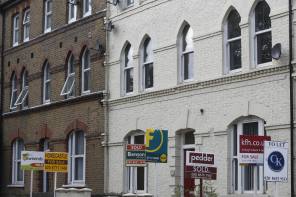

Advisers and other property experts urged potential homeowners not to panic after the Halifax House Price Index indicated a slowing housing market including a fall in prices in the last month of 2017.
Figures from Halifax showed that house prices in the three months to December were 1.3 per cent higher than the previous quarter.
However, house prices had been growing at 1.3 per cent in October and November, while the annual rate of growth also moderated 3.9 per cent in November to 2.7 per cent last month.
Figures for December itself showed house prices had fallen 0.6 per cent, the first monthly decline the index has shown in six months.
Russell Galley, managing director of Halifax Community Bank, said the figures anticipated and followed a similar pattern to the previous year.
He said: "Nationally house prices in 2018 are likely to be supported by the ongoing shortage of properties for sale, low levels of housebuilding, high employment and a continuation of low interest rates making mortgage servicing affordable in relative terms.
"Overall we expect annual price growth to continue in the range of 0 to 3 per cent at the end 2018."
Jeremy Duncombe, exiting director of Legal & General Mortgage Club, said the market was "on a strong footing for 2018" thanks to price growth that is now in line with wage inflation.
He said: "House price inflation looks likely to hold steady in the short-term, which will give first-time buyers a greater chance of stepping onto the property ladder.
"With thousands of mortgage products now available, anyone who is unsure of where to begin should get in touch with a mortgage broker for advice."
Jonathan Hopper, managing director of Garrington Property Finders, said the UK property market "is far from seizing up".
Mr Hopper said: "More than 100,000 homes were sold in every month of 2017, and many parts of the UK ended the year with a spring in their step – with brisk demand firing respectable, if not stellar, price growth.
"Yet it is a different story in parts of London, where a flight of equity is sucking the momentum out of price rises.
"On the front line we are seeing a split between domestic buyers who are increasingly looking beyond the capital for better value elsewhere, and astute international investors who are capitalising on softening prices and the weak pound to buy in some of the most prestigious postcodes.
"A decade on from the financial crash, there is an uncomfortable similarity in the ratio of the average property price to the average salary – with the Halifax's data showing the multiple is now the same as it was when the market fell apart."
Chris Taylor, managing director of advisory firm Regency Residential, said the figures showing falls in the London market were "mainly a correction following years of unprecedented growth.
He said: "More developers are building entry-level properties and beginning to address the affordability issue.
"Coupled with the chancellor's move to abolish stamp duty for first time buyers on properties under £300k and a weak pound encouraging increasing investment from abroad, this will see a stimulus in the market which should sustain prices, especially in properties outside the capital where yields and entry prices are more attractive."
Separately, figures from online property portal HouseSimple showed that there were fewer properties being listed on the market, with new properties listed down more than a third on November.
Alex Gosling, founder of HouseSimple, said: "The property market needs a sizeable bounce in January after 2017 ended with a whimper.
"It was a tough year with Article 50 and the general election to contend with and there were already signs in November that sellers had decided to hold fire until the New Year. December confirmed that assertion, with new listings tumbling last month.
"Historically, we do tend to see an uplift in activity in January, and with the stamp duty cut incentivising first-time buyers to purchase, this will hopefully act as a stimulus to sellers who have been reluctant to market."



